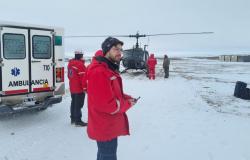
Journalist José Ignacio López was honored this Friday by the Legislature of the City of Aires as “Outstanding Personality” for his “invaluable contribution to journalism, politics, culture and the defense of human rights In our country”.
“It is an era that is leaving us, that will never return,” one of the attendees was moved by the great turnout that the tribute to “Nacho” López had, which overflowed the Golden Hall of the Buenos Aires Legislature, with more than 200 personalities who were able to sit and dozens of other people who stood for almost two hours to applaud and follow the emotional tribute to the outstanding journalist.
On Journalist’s Day, the former spokesperson of President Raúl Alfonsín received the distinction from the journalist Julio Bazanthe legislator Ines Parry and the first vice president of the Legislature, Matias Lopez.
“There are three moments in Nacho’s life in which civic courage appears: when he asks Videla about the disappeared, his moral militancy alongside Raúl Alfonsín and his call to the Argentine Dialogue” in the 2001 crisis, highlighted the economist and historian Pablo Gerchunoff, who shared the stage with Carolina Amoroso, Ignacio Otero and Diego Cabot.
Journalist Otero recalled when “Nacho” López asked the dictator Jorge Rafael Videla about the disappeared, at that press conference in 1979. “It is a mystery, he is a disappeared person, he has no entity, he is neither dead nor alive, he is a missing”, Videla responded, visibly nervous, when questioned by “Nacho” López, in a phrase that remained engraved in the memory of several generations.
“There is something that sums it all up and that ‘Nacho’ is a beacon. If one does not bother the power and no one gets angry, it is like something is missing. That is one of the essences of the journalist: listening and making the power uncomfortable.r. Nacho did it and for that we are all grateful to him,” journalist Cabot told him.
“Would you choose journalism again?” Carolina Amoroso asked him. And López responded, to his young 87 years: “I didn’t leave journalism. Journalism is my life.”
Among the attendees, some commented to Clarion other anecdotes from his journalistic career, such as when he told the military controller of the newspaper La Opinión that he was a friend of the then-disappeared detainee Jacobo Timerman, when they planted a bomb in his house in 1976, when he asked the dictator Pinochet about the detainees in Chile and his “immense work” as spokesperson for Alfonsín, during his democratic recovery government.
López pointed out that “when they ask me so many times about today’s spokesperson and yesterday’s, I say that they cannot be compared, because it is a function that requires a fundamental decision from the President of the Nation. If the President does not consider as he should that journalism has a role to play in the functioning of democracy, of the republic, that journalism is the mediator with public opinion, the one that collects and has to exercise freedom of expression that protects everyone, not just journalists, it also has to respect the right to information. So, “If the president of the Nation does not grant that role to journalism, it is very difficult for anyone to communicate that.”
“If the President believes that communication is direct and does not require intermediaries, then it cannot be compared. Furthermore, when I was spokesperson there was no Internet, no cell phone, or anything,” López added.
And he demanded the contribution “of the entire leadership” to “contribute to our society recovering social conversation, respectful debate, dialogue that must be in our leadership. And admitting that fights, insults and disqualifications may give us a lot of ratings and sell a little more, but that is not journalism,” said López.
Graduated from the Grafotécnico Institute, López was a permanent collaborator of Clarion, deputy editor-in-chief of La Nación, editor-in-chief of Extra and editor-in-chief of La Opinión. He also worked in the DyN and NA agencies, as well as in Radio Continental, accompanying Magdalena Ruiz Guiñazú on the first informative morning. He was also Alfonsín’s spokesperson, with the rank of Secretary of State, throughout his entire mandate. And in the 2001 crisis, he was part of the Argentine Dialogue, becoming a bridge between society and the political leadership.
José Ignacio López received the distinction in the Buenos Aires Legislature along with three of his children, grandchildren and other relatives who came to honor him.
Some of those who participated in the event were journalists Ricardo Kirschbaum, general editor of Clarion; Andrés D’Alessandro, executive director of ADEPA; Joaquín Morales Solá, Eduardo Van der Kooy, Daniel Santoro, Sergio Rubin, Silvia Naishtat, Carlos Campolongo, Fernando Ruiz, Ricardo Pipino and Ricardo Mosso, among others.
They were also the sociologist Juan Carlos Torre, who participated in the economic team of the Alfonsín government; Alfonsín’s historic secretary, Margarita Ronco; Juan Radonjic, former Secretary of Public Information; Oscar Muiño and Ricardo Porto, former undersecretaries of Public Information; Ana María Mustapic, vice president of CIPPEC; Juan Pablo Zanetta, member of the Buenos Aires Judicial Council; Martín Ocampo, president of the Buenos Aires UCR.
Buenos Aires legislators Francisco Loupias and Fernanda Mollard (UCR) also participated; deputy Leandro Santoro (Union for the Homeland); the former mayor Facundo Suarez Lastra (UCR), the former deputy Marcelo Stubrin (UCR), the former vice governor of Buenos Aires Elva Roulet (UCR); former senator Norma Morandini (Civic Front of Córdoba); and the representative of the Community of San Egidio, Marco Gallo.
The second vice president of the Buenos Aires Legislature, Graciela Ocaña, sent their endorsements to the event; the president of the LED Foundation (Freedom of Expression + Democracy), Silvana Giudici. And a fragment of the documentary “Memory to build” was broadcast, which José Ignacio López premiered last year, about his legacy in these 40 years of democracy, directed by Gabriel Mazzaglia.





